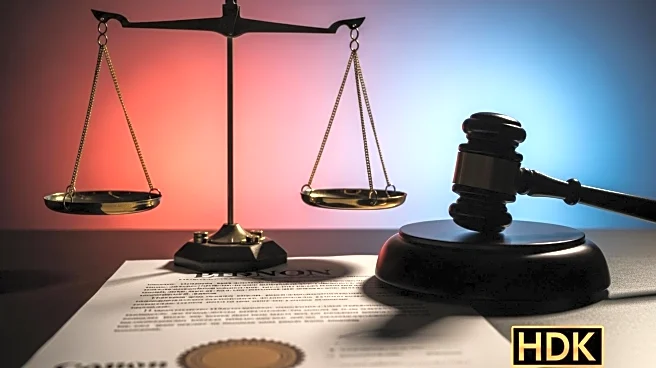What's Happening?
Acting U.S. Attorney Lindsey Halligan has secured an indictment against former FBI Director James Comey, charging him with making a false statement and obstruction of a congressional proceeding. This development follows Halligan's recent appointment and the resignation of her predecessor, Erik Siebert, amid pressure from the White House to prosecute Comey. The indictment was pursued despite a memo from career prosecutors in Halligan's office suggesting that probable cause was lacking. The charges are linked to a five-year statute of limitations set to expire soon. Comey has denied any wrongdoing, expressing confidence in the judicial system and readiness for trial. His arraignment is scheduled for October 9 before U.S. District Judge Michael S. Nachmanoff.
Why It's Important?
The indictment of James Comey is significant as it highlights ongoing political tensions and the influence of the White House on judicial proceedings. The case could have implications for the Justice Department's independence and the perception of political retribution under President Trump's administration. The outcome may affect public trust in federal institutions and could influence political dynamics, especially with Comey's history of opposition to Trump. The case also raises questions about the role of acting officials in high-profile legal decisions and the potential impact on future judicial appointments.
What's Next?
Comey's trial is set to begin with his arraignment on October 9, which will be closely watched for its legal and political ramifications. The proceedings may prompt reactions from political leaders and could influence public opinion ahead of upcoming elections. The Justice Department's handling of the case may be scrutinized, potentially affecting its reputation and future operations. Stakeholders, including political parties and civil society groups, may respond to the trial's developments, shaping the narrative around judicial independence and political accountability.
Beyond the Headlines
The indictment of Comey could have long-term implications for the legal and ethical standards within the Justice Department. It may trigger discussions on the balance between political influence and judicial integrity, potentially leading to calls for reforms. The case also underscores the challenges faced by public officials in navigating political pressures while maintaining professional ethics. The broader cultural impact may involve debates on the role of law enforcement in political conflicts and the importance of safeguarding democratic institutions.








